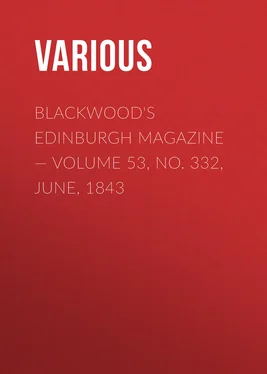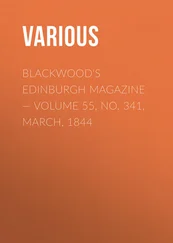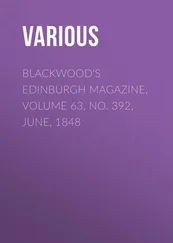Various - Blackwoods Edinburgh Magazine – Volume 53, No. 332, June, 1843
Здесь есть возможность читать онлайн «Various - Blackwoods Edinburgh Magazine – Volume 53, No. 332, June, 1843» — ознакомительный отрывок электронной книги совершенно бесплатно, а после прочтения отрывка купить полную версию. В некоторых случаях можно слушать аудио, скачать через торрент в формате fb2 и присутствует краткое содержание. Жанр: foreign_antique, periodic, foreign_edu, на английском языке. Описание произведения, (предисловие) а так же отзывы посетителей доступны на портале библиотеки ЛибКат.
- Название:Blackwoods Edinburgh Magazine – Volume 53, No. 332, June, 1843
- Автор:
- Жанр:
- Год:неизвестен
- ISBN:нет данных
- Рейтинг книги:4 / 5. Голосов: 1
-
Избранное:Добавить в избранное
- Отзывы:
-
Ваша оценка:
- 80
- 1
- 2
- 3
- 4
- 5
Blackwoods Edinburgh Magazine – Volume 53, No. 332, June, 1843: краткое содержание, описание и аннотация
Предлагаем к чтению аннотацию, описание, краткое содержание или предисловие (зависит от того, что написал сам автор книги «Blackwoods Edinburgh Magazine – Volume 53, No. 332, June, 1843»). Если вы не нашли необходимую информацию о книге — напишите в комментариях, мы постараемся отыскать её.
Blackwoods Edinburgh Magazine – Volume 53, No. 332, June, 1843 — читать онлайн ознакомительный отрывок
Ниже представлен текст книги, разбитый по страницам. Система сохранения места последней прочитанной страницы, позволяет с удобством читать онлайн бесплатно книгу «Blackwoods Edinburgh Magazine – Volume 53, No. 332, June, 1843», без необходимости каждый раз заново искать на чём Вы остановились. Поставьте закладку, и сможете в любой момент перейти на страницу, на которой закончили чтение.
Интервал:
Закладка:
The murder scene was the next triumph: her acting was that of a triumphant fiend. I must follow these recollections no further; but the most admirable piece of dumb show that perhaps ever was conceived, was her "Banquet scene." That scene, from the terrible business on the stage—the entrance of Banquo's ghost, the horrors of Macbeth, stricken in the moment of his royal exultation, and the astonishment and alarm of the courtiers—is one of the most thrilling and tumultuous. Yet Siddons, sitting at the extremity of the royal hall, not having a syllable to utter, and simply occupied with courtesies to her guests, made her silence so expressive, that she more than divided the interest with the powerful action going on in front. And when at last, indignant at Macbeth's terrors, stung by conscience, and alarmed at the result of an up-breaking of the banquet with such rumours in their lips, she rushed towards her unhappy husband, and burst out with the words, still though but whispered, yet intensely poured into his passive ear—
"Are you a man ?
This is the very painting of your fear!
This is the air-drawn dagger, which, you said,
Led you to Duncan!—
Why do you make such faces? When all's done,
You look but on a stool !"
In those accents all else was forgotten.
But her sleep-walking scene! When shall we see its "second or its similar?" Nothing so solemn, nothing so awful, was ever seen upon the stage. Yet it had one fault—it was too awful. She more resembled a majestic shade rising from the tomb than a living woman, however disturbed by wild fear and lofty passion. It is a remarkable instance of the genius of Shakspeare, that he here found the means of giving a human interest to a being whom he had almost exalted to the "bad eminence" of a magnificent fiend. In this famous soliloquy, the thoughts which once filled and fired her have totally vanished. Ambition has died; remorse lives in its place. The diadem has disappeared; she thinks only of the blood that stains her for ever. She is the queen no more, but an exhausted and unhappy woman, worn down by the stings of conscience, and with her frame dying by the disease of her soul.
But Siddons wanted the agitation, the drooping, the timidity. She looked a living statue. She spoke with the solemn tone of a voice from a shrine. She stood more the sepulchral avenger of regicide than the sufferer from its convictions. Her grand voice, her fixed and marble countenance, and her silent step, gave the impression of a supernatural being, the genius of an ancient oracle—a tremendous Nemesis.
I have seen all the great tragedians of my day, but I have never seen an equal to the sublime of this extraordinary actress. I have seen beauty, youth, touching sensibility, and powerful conception; but I never saw so complete an union of them all—and that union was the sublime. Shakspeare must have had some such form before his mind's eye, while he was creating the wife of Macbeth. Some magnificent and regal countenance, some movement of native majesty, some imaginary Siddons. He could not have gone beyond the true. She was a living Melpomene.
The business of the War-Office was not transacted in those days with the dispatch subsequently introduced by the honest Duke of York. After a delay of weeks I found myself still ungazetted, grew sad, angry, impatient; and after some consideration on the various modes of getting rid of ennui , which were to be found in enlisting the service of that Great Company which extended its wings from Bombay to Bengal, as Sheridan said, impudently enough, like the vulture covering his prey; or in taking the chance of fortune, in the shape of cabin-boy on board one of the thousand ships that were daily floating down the Thames, making their way to the extremities of the earth; or in finishing my feverish speculations in a cold bath at the bottom of the Thames itself; I did what I felt a severer exertion than any of them—I wrote a full and true statement of my vexations to my lordly brother.
His answer was lordly enough. He had been "so much occupied with the numberless duties devolving upon him as landlord, magistrate, lord-lieutenant, and fifty other things, that he absolutely had not been able to find a moment to think of me;" and what was rather more perplexing to my immediate sensibilities, "he had not been able to send me a shilling. However, he did all that he could, and gave me a note to a particular friend," Mr Elisha Mordecai of Moorfields.
There is nothing which quickens a man's movements like a depletion of the purse; and instead of lounging at my hotel until the morning paper brought me the scandals and pleasantries of the day before fresh for my breakfast-table, I threw myself out of bed at an hour which I should not have ventured to mention to any man with whom I walked arm-in-arm during the day, and made my way in a hackney coach, to avoid the possibility of being recognised, to the dwelling of my new patron, or rather my guide and guardian angel.
I make no attempt to describe the navigation through which I reached him; it was winding, dark, and dirty beyond all description, and gave the idea of the passages of a dungeon rather than any thing else that I could name. And in a hovel worthy to finish such a voyage of discovery, I discovered Mr Elisha Mordecai, the man of untold opulence. For a while, on being ushered into the office, where he sat pen in hand, I was utterly unable to ascertain any thing of him beyond a gaunt thin figure, who sat crouching behind a pile of papers, and beneath a small window covered with the dirt of ages. He gave me the impression in his dungeon of one of those toads which are found from time to time in blocks of coal, and have lain there unbreathing and unmoving since the deluge. However, he was a man of business, and so was I for the moment. I handed him my brother's note; and like a ray of sunshine on the torpid snake, it put him into immediate motion. He now took off his spectacles, as if to indulge himself with a view of me by the naked eye; and after a scrutinizing look, which, in another place and person, I should probably have resented as impertinent, but which here seemed part of his profession, he rose from his seat and ushered me into another apartment. This room was probably his place of reception for criminals of a more exalted order; for it was lined with foreign prints, had one or two tolerable Dutch pictures, and a bookcase. Out of his bookcase he took down a folio, examined it, compared the writing of my credentials with the signatures of a book which, as Cromwell's son said of his trunk, contained the lives and fortunes, or at least that on which depended the lives and fortunes, of half the noble roués of England, their "promises to pay," bonds, mortgages, and post-obits, and then performed the operation on myself. My L.2500 in prospect was mulcted of a fifth for the trouble of realizing it; of another fifth for prompt payment, and of another for expediting the affair of my commission. "Another such victory would have ruined me."
However, I bore the torture well. In truth, I had so little regard for any object but the grand one of wearing a sword and epaulette, that if Mordecai had demanded the whole sum in fifths, I should have scarcely winced. But my philosophy stood me in good part, for it won a grim smile from the torturer, and even a little of his confidence.
"This," said he, running his finger down a list which looked endless, "I call my peerage book." Turning to another of equal dimensions, "there lies my House of Commons. Not quite as many words wasted in it as in the Honourable House, but rather to the purpose."
Mordecai grew facetious; the feeling that he had made a handsome morning's work of it put him into spirits, and he let me into some of the secrets of high life, with the air of a looker-on who sees the whole game, and intends to pocket the stakes of the fools on both sides. "Money, Mr Marston," said my hook-nosed and keen-eyed enlightener, "is the true business of man. It is philosophy, science, and patriotism in one; or, at least, without it the whole three are of but little service. Your philosopher dies in a garret, your man of science hawks telescopes, and your patriot starves in the streets, or gets himself hanged in honour of the 'Rights of Man.' I have known all these things, for I was born a German, and bred among the illustrissimi of a German university. But I determined not to live a beggar, or at least not to die one. I left Gottingen behind on a May morning, and trudged, fought, and begged, 'borrowed' my way to London. What I am now, you see."
Читать дальшеИнтервал:
Закладка:
Похожие книги на «Blackwoods Edinburgh Magazine – Volume 53, No. 332, June, 1843»
Представляем Вашему вниманию похожие книги на «Blackwoods Edinburgh Magazine – Volume 53, No. 332, June, 1843» списком для выбора. Мы отобрали схожую по названию и смыслу литературу в надежде предоставить читателям больше вариантов отыскать новые, интересные, ещё непрочитанные произведения.
Обсуждение, отзывы о книге «Blackwoods Edinburgh Magazine – Volume 53, No. 332, June, 1843» и просто собственные мнения читателей. Оставьте ваши комментарии, напишите, что Вы думаете о произведении, его смысле или главных героях. Укажите что конкретно понравилось, а что нет, и почему Вы так считаете.












